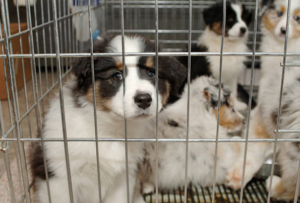

Living Conditions


The joy of welcoming a new furry friend into our homes is unparalleled, but behind the charming facade of pet stores and online advertisements lies a dark reality – puppy mills. These commercial breeding facilities prioritize profit over the well-being of animals, subjecting them to deplorable conditions and a lifetime of suffering. In this comprehensive exploration, we delve into the shocking world of puppy mills, exposing the hidden cruelty behind mass breeding and advocating for a more humane approach to pet acquisition.
Puppy mills, often shrouded in secrecy, are industrial-scale breeding facilities where profit takes precedence over the well-being of animals. Located in various regions, these facilities can range from small, clandestine operations to larger, more sophisticated enterprises. The primary objective of puppy mills is to churn out as many puppies as possible to meet market demand, often sacrificing essential aspects of animal care.
Operation Scale and Structure:
Puppy mills can vary significantly in size, housing anywhere from dozens to hundreds of breeding dogs. The facilities are designed for efficiency and economy, with little consideration for the comfort or health of the animals. Dogs are typically kept in stacked, wire-floored cages, resulting in overcrowded and unsanitary conditions.
Breeding for Profit:
The core philosophy driving puppy mills is profit maximization. Female dogs are bred at every heat cycle, leading to a perpetual cycle of pregnancy and nursing. This relentless breeding takes a severe toll on the physical and emotional well-being of the mother dogs, who seldom receive the care or attention necessary for a healthy life.
One of the most significant challenges in combating puppy mills is the lack of consistent and stringent regulations governing breeding practices. In many jurisdictions, existing laws are insufficient or poorly enforced, allowing puppy mills to operate with little fear of legal repercussions.
Legal Loopholes:
Puppy mills exploit legal loopholes that permit them to operate without adequate oversight. Some facilities may pose as legitimate breeding operations, obtaining licenses that are easily acquired or poorly regulated, while others operate entirely unlicensed and under the radar.
Lack of Inspection:
Due to resource constraints and the sheer number of breeding facilities, regulatory agencies often struggle to conduct regular inspections. Even when inspections occur, they may be announced in advance, providing mill operators with an opportunity to conceal or temporarily improve conditions.
Interstate Commerce:
The interstate nature of puppy mill operations further complicates regulatory efforts. Dogs bred in mills are often transported across state lines to be sold in different markets, making it challenging to trace and regulate their origins effectively.
Online Platforms:
The advent of online pet sales has provided puppy mills with a new avenue for profit. Many mills operate websites or use third-party platforms, making it easier to reach a broader audience while evading traditional oversight.
Shell Corporations:
Some puppy mills use complex business structures, including shell corporations, to shield themselves from legal consequences. These convoluted arrangements make it difficult for authorities to trace ownership and hold individuals accountable for the conditions in which the animals are kept.
The living conditions in puppy mills are a harrowing reflection of the industry’s focus on profit at the expense of animal welfare. Dogs in these facilities are often subjected to overcrowded and unsanitary environments, perpetuating a cycle of suffering.
Caged Confinement:
Dogs in puppy mills spend their lives confined to small, wire-floored cages that provide minimal space for movement. These cages are stacked on top of each other, creating a vertical prison where animals live in close proximity to one another.
Lack of Adequate Shelter:
Inadequate shelter from harsh weather conditions is another aspect of the hidden cruelty. Dogs are exposed to extreme temperatures without proper insulation, leaving them vulnerable to heatstroke in the summer and frostbite in the winter.
Absence of Mental Stimulation:
The monotony of life in a cramped cage leads to profound boredom and mental distress. Dogs have no opportunity for mental stimulation, play, or exploration, contributing to behavioral problems and diminished overall well-being.
Spread of Disease:
Overcrowded conditions facilitate the rapid spread of diseases among the animals. The lack of proper veterinary care exacerbates health issues, as contagious illnesses can quickly move through the confined population, affecting dogs of all ages.
One of the most insidious aspects of puppy mills is the systemic neglect of veterinary care. Dogs in these facilities suffer from untreated medical conditions, leading to prolonged agony and often resulting in severe consequences.
Untreated Infections:
In the absence of regular veterinary check-ups, common health issues such as ear infections, respiratory infections, and skin conditions go untreated. Persistent infections can cause chronic pain and discomfort for the affected animals.
Dental Neglect:
Dental hygiene is a critical aspect of overall health for dogs. However, in puppy mills, dental issues are widespread due to the lack of dental care. Untreated dental problems can lead to pain, difficulty eating, and systemic health issues.
Uncontrolled Breeding Health Complications:
Female dogs in puppy mills endure continuous breeding cycles without proper rest or medical attention. This relentless exploitation can lead to complications such as dystocia (difficulties during labor), uterine infections, and other reproductive health issues.
The hidden cruelty of puppy mills is particularly evident in the relentless breeding practices imposed on female dogs. This perpetual cycle of breeding serves the profit-driven motives of the industry but inflicts severe physical and emotional distress on the animals.
Lack of Maternal Care:
Puppy mill operators often prioritize separating puppies from their mothers as early as possible to maximize profits. The absence of proper maternal care denies both the mother and the puppies the essential bonding and nurturing crucial for healthy development.
Prenatal and Neonatal Neglect:
Pregnant dogs in puppy mills are seldom provided with the necessary prenatal care, including proper nutrition and veterinary check-ups. Consequently, puppies are born into conditions that predispose them to health issues from the outset.
Inadequate Nutrition:
Nutritional neglect is a common theme in puppy mills, where substandard diets are provided to dogs. The lack of proper nutrition exacerbates health problems, compromises immune systems, and contributes to a range of preventable issues.
Low-Quality Diets:
Dogs in puppy mills are often fed inexpensive, low-quality food that lacks the essential nutrients necessary for their well-being. Subpar diets contribute to malnutrition, weakened immune systems, and overall poor health.
Impact on Growth and Development:
Puppies born in puppy mills are particularly susceptible to developmental issues due to inadequate nutrition during crucial growth stages. This can result in skeletal deformities, stunted growth, and long-term health complications.
Lack of Access to Clean Water:
In addition to poor nutrition, dogs in puppy mills may lack access to clean and sufficient water. Dehydration poses additional risks to their health, exacerbating the already challenging conditions in which they live.
Genetic Health Issues
Mass breeding in puppy mills prioritizes quantity over the selection of healthy breeding pairs. This results in a proliferation of genetic disorders and health issues in the puppies born in such facilities.
Behavioral Problems
The lack of socialization and proper care in puppy mills contributes to the development of behavioral problems in the animals. Fear, anxiety, and aggression are common issues seen in dogs rescued from these facilities.
Shortened Lifespan
Due to the harsh conditions and inadequate care, dogs born in puppy mills often have significantly shortened lifespans. The toll on their physical and mental health reduces the quality and length of their lives.
Profit Motive
At the heart of the puppy mill issue is the profit motive. Mass breeding allows for a constant supply of puppies to meet market demand, resulting in a lucrative business model for those prioritizing financial gain over ethical considerations.
Lack of Transparency
Puppy mills thrive on the lack of transparency in the breeding and sale process. Unscrupulous breeders often use deceptive marketing tactics, making it challenging for consumers to differentiate between reputable breeders and those operating puppy mills.
Online Sales
The rise of online platforms for pet sales has further exacerbated the puppy mill problem. The anonymity afforded by the internet allows unethical breeders to operate with minimal accountability, selling puppies to unsuspecting buyers.
Weak Regulatory Frameworks
The legal frameworks surrounding puppy mills vary widely, with some regions having insufficient regulations to address the problem adequately. Strengthening and enforcing existing laws are essential steps in combatting the cruelty of mass breeding operations.
The Role of Consumer Awareness
Empowering consumers with knowledge about the conditions in puppy mills is crucial for effecting change. Educated consumers can make informed decisions, avoiding purchases from sources that support unethical breeding practices.
Advocacy for Stricter Legislation
Advocacy plays a pivotal role in the fight against puppy mills. By supporting and promoting legislation that protects the welfare of animals, advocates contribute to creating a more humane and ethical environment for breeding and pet acquisition.
The Importance of Adoption
Choosing adoption over purchasing from breeders or pet stores is a powerful way to combat the puppy mill industry. Shelters and rescue organizations provide loving homes for animals in need, offering a humane alternative to mass breeding.
Supporting Reputable Breeders
For those seeking a specific breed, supporting reputable breeders who prioritize the health and well-being of their animals is crucial. Responsible breeders prioritize ethical breeding practices, health screenings, and humane treatment of their animals.
Public awareness campaigns play a vital role in changing societal attitudes towards puppy mills. Education initiatives that highlight the hidden cruelty behind mass breeding can shift consumer behavior and promote a culture of responsible pet ownership.
Exposing the hidden cruelty behind puppy mills is a crucial step towards eradicating this inhumane industry. By understanding the conditions these animals endure and the economic factors driving mass breeding, we can collectively work towards creating a world where every pet is treated with the love and respect they deserve. Through advocacy, responsible pet acquisition, and the promotion of ethical breeding practices, we can dismantle the dark reality of puppy mills and pave the way for a brighter, more compassionate future for our four-legged companions.
Sustainable Shades For many DIY enthusiasts and design aficionados, a fresh coat of paint is…
Cruelty-Free Solutions for a Healthier You Chronic inflammation can be a relentless foe, disrupting our…
Unleashing Your Brain's Potential In today's fast-paced world, maintaining sharp mental focus and cognitive agility…
Exploring DIY Organic Makeup Fixers For the eco-conscious beauty enthusiast, the quest for flawless makeup…
A Sensitive Exploration The clean beauty movement has taken the beauty world by storm. Consumers…
Taming the Mane Frizz – the bane of smooth hair dreams. It can transform a…
This website uses cookies.